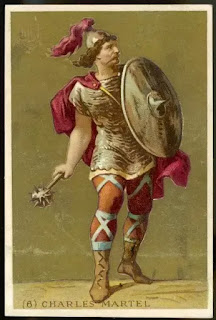Gregory of Tours mentions, regarding an event in which the body of King Clovis I was exhumed, "Though I did not know who he was, I recognised from the length of the hair that it was Clovis." Elsewhere he refers to theFranks as
reges criniti, the "long-haired kings." The
post just prior to this tells of a choice offered to a queen to have princes shorn or killed; she chooses killed rather than the shame of princes who are shorn of their locks and therefore denied the chance to some day rule. Gregory tells another anecdote of King Clovis defeating a rival king who betrayed him, Chararic, cutting short the hair of him and his son and confining them in a monastery. When it was later reported to Clovis that the son had remarked to his father that they should grow their hair long again, Clovis had them killed.
Human cultures have developed many ways to indicate social cues, and hair length and style has certainly been one way to distinguish the upper from the lower echelons, but the Merovingians took it to an entirely new level.
We have every reason to believe that the Franks, like the Romans, kept their hair short, so the Merovingian line of royalty would have stood out from the common folk. It was not necessary that the hair had never been cut, just that it was long. Why this was so, we cannot say for certain. Some suggest it is simply a distinction between the Germanic military culture and the Roman religious culture of the various peoples that the Merovingians conquered, but that is too simplistic to be accurate.
When the Merovingian kings began to become lazy, their "Mayors of the Palace" managed their affairs, effectively running the kingdom. The last Merovingian king was Childeric III, whose Mayor of the Palace was Charles Martel, the "Hammer." According to Charlemagne's biographer Einhard, Charles allowed Childeric "to sit on his throne, content with the name of king only, with his long hair and flowing beard, and give the appearance of sovereignty." Eventually, Martel's son, Pepin the Short, took the throne with the backing of Pope Zachary. He had Childeric tonsured and sent with his also-shorn son Theuderic to separate monasteries.
You may recall in the post on Childebert how his brother Chlodomer was killed in battle against Burgundy. A Byzantine historian, Agathias, writes a contemporary account of the battle, giving us a little more on the attitude toward hairstyles in different cultures:
And when he fell, the Burgundians, seeing his hair flowing and abundant, loose down to his back, at once realised that they had killed the enemy leader. For it is the rule for Frankish kings never to be shorn; instead, their hair is never cut from childhood on, and hangs down in abundance on their shoulders. Their front hair, is parted on the forehead and falls down on either side. Their hair is not uncombed and dry and dirty and braided up in a messy knot like that of the Turks and Avars; instead, they anoint it with unguents of different sorts, and carefully comb it. Now this it is their custom to set apart as a distinguishing mark and special prerogative for the royal house. For their subjects have their hair cut all round, and are not permitted to grow it further.
The few seals of Merovingian kings that we have show the long hair, parted in the middle. Hair styles among the common folk might have been varied, but notably long hair was reserved for, and crucial to, the Merovingian royalty.
Now for another of those names I feel I have neglected: Einhard is significant because of his life of Charlemagne, and I'll tell you more next time.


